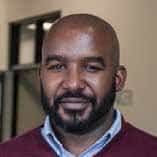It’s safe to assume that everyone reading this column has faced some type of obstacle this week. It’s almost a given that life is going to throw things into our path that seek to deter us from getting accomplished what we need to get done. We are not the first people to experience this. Joshua 3 looks at how God’s children dealt with an obstacle that was in their way as they tried to move towards the Promised Land.
 Terrell CarterAt this point in the Book of Joshua, God’s children are camped on one side of the Jordan River and Joshua told them that God wanted them to cross over to the other side. This act of crossing the Jordan River would be the literal first step into the Promised Land. But there was a problem. The river was flooded and nearly impossible to cross. For them to enter the Promised Land, they would have to trust God to bring them through this raging river. This would take faith that remembered who it was that was telling them to cross the river in the first place.
Terrell CarterAt this point in the Book of Joshua, God’s children are camped on one side of the Jordan River and Joshua told them that God wanted them to cross over to the other side. This act of crossing the Jordan River would be the literal first step into the Promised Land. But there was a problem. The river was flooded and nearly impossible to cross. For them to enter the Promised Land, they would have to trust God to bring them through this raging river. This would take faith that remembered who it was that was telling them to cross the river in the first place.
As the people contemplated God’s instructions, they faced the challenge of whether they would be able to remember all the history that God had secured of providing for their parents and grandparents and helping them overcome multiple obstacles. Would they be willing and able to step out on faith and trust that God was with them as they faced this latest obstacle?
We know how this part of the story ends. The priests carry the Ark of the Covenant to the river while the people follow behind them. When the priests begin to walk into the river, the waters stop flowing. The Hebrew scriptures tell us that upstream, something had occurred which caused the waters to stop flowing right around the time the priest stepped into the river. No one could have predicted that, but God was true to God’s word and made it possible for them to cross the river on dry ground.
As I think about this chapter in Israel’s journey, a few things come to mind. First, we all have obstacles that we face in life as we seek to live in out our relationship with God. It is okay to recognize that life, especially a life that seeks to be pleasing to God, is never easy. We regularly face distraction and temptation to do things contrary to God’s will.
Second, uncertainty is not always a terrible thing, especially as it relates to following God and seeking to do God’s will. Neither Joshua nor the people had any idea how God would make it possible for them to cross the river. But, God did not ask them to have the plan figured out beforehand. God already had it figured out in the form of a natural action of nature. What God wanted from all of them was trust that God would be as good as God’s promises.
Third, if we follow God, or make God the focus of our journey, God will lead us through the challenges and roadblocks that try to divert us from the Promised Land. I think we can all admit that sometimes, when we are experiencing challenges of life, we may seek to be in God’s presence, but our focus is not fully on God, but on whatever challenge it is that we face. That’s understandable, but when we recognize that is what’s happening, we can be like Joshua and the people and make God our focus as much as possible.
Fourth, and finally, when we experience roadblocks, what do we fall back on that reminds us of how God has been faithful to us in the past? What victories or testimonies do we have that remind us of how God has been faithful and strong on our behalf? We can celebrate those things and keep them close to our hearts. May they serve as reminders for us, and others, of God’s faithfulness. Amen.
Terrell Carter is assistant professor and director of contextualized learning at Central Baptist Theological Seminary in Shawnee, Kan., and pastor of Webster Groves Baptist Church in Mo.

